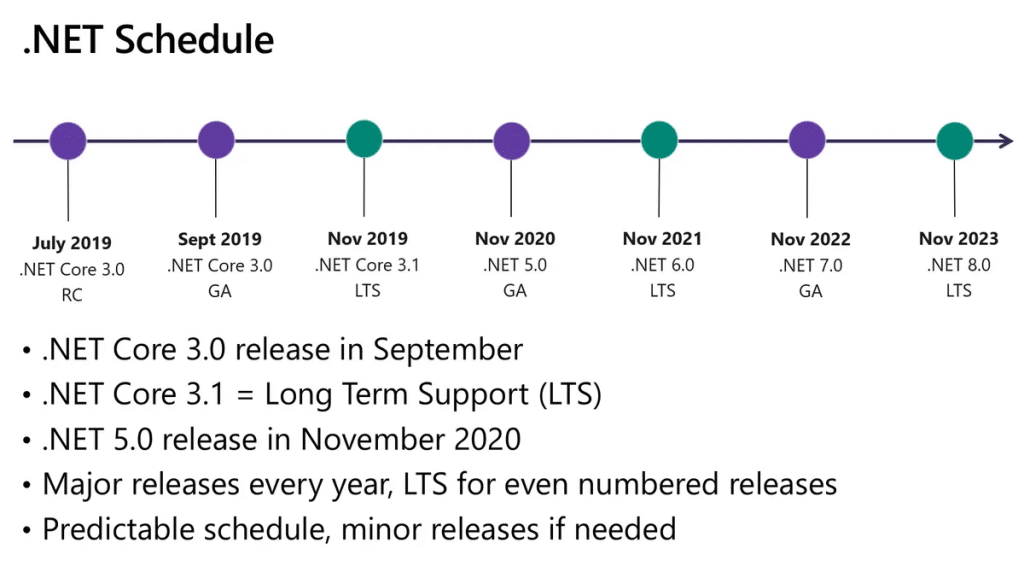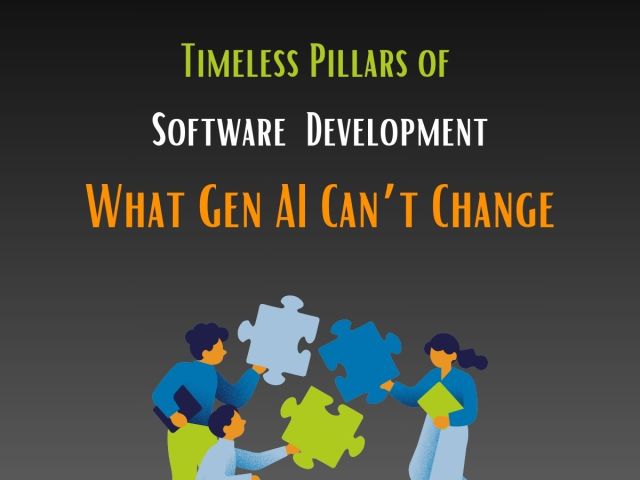In the dynamic realm of software development, evolution is the constant, and innovation the lifeblood. Today, we embark on a journey through the landscape of .NET Core, a framework that has not only reshaped the way we build applications but has redefined the future of .NET itself.
From its inception in 2014 to the latest milestone in 2019, .NET Core has undergone a remarkable transformation by setting new standards and pushing boundaries. Our aim is to uncover the pivotal moments, the paradigm shifts, and the future it promises.
Join us as we delve into the world of .NET Core, uncovering the insights that every developer needs to know. Let’s navigate through the changes, understand the decisions, and grasp the implications of this monumental shift.
Welcome to a journey that goes beyond the code — it’s a glimpse into the future of development.

What is .NET Core?
.NET Core, developed by Microsoft, is a modern, open-source framework that allows the creation of applications and services for mobile, web, and Windows platforms. It is known for being lightweight, fast, and compatible with Windows, Linux, and Mac operating systems.
Key Characteristics: Some key attributes of .NET Core include its open-source nature, cross-platform functionality, high performance, support for Docker containers, emphasis on microservices architecture, adaptability to future requirements, seamless integration with GitHub and NuGet, and compatibility with command line tools.
Key Features of .NET Core:
1. Open Source:
-
- Embraces an open-source model, promoting collaboration and community-driven development.
- Supported and guided by the .NET Foundation, ensuring a robust ecosystem.
2. Universal Platform Agility:
-
- Exhibits seamless cross-platform compatibility across Windows, Linux, and macOS, ensuring flexibility in deployment.
3. Optimized Performance:
-
- Engineered for high-performance, scalable applications, guaranteeing swift and resource-efficient execution.
4. Containerized Deployment:
-
- Accommodates Docker containers, streamlining deployment and enabling efficient resource utilization.
5. Architectural Flexibility:
-
- Tailored to effortlessly support microservices architecture, facilitating modular and scalable application design.
6. Forward-Thinking Development:
-
- Anticipates and addresses future technological needs, ensuring relevance and adaptability for evolving requirements.
7. Cloud-First Orientation:
-
- Designed with cloud deployment as a primary consideration, showcasing exceptional performance advantages over alternative platforms.
8. Seamless Integration Capabilities:
-
- Provides smooth integration with popular development tools such as GitHub and NuGet, enhancing collaboration and workflow efficiency.
9. Command Line Empowerment:
-
- Supports a robust command-line interface, granting developers powerful tools for streamlined development workflows.
10. Built on Proven Expertise:
-
- Leverages the established foundation of the .NET Framework, drawing from a wealth of industry knowledge and experience.
11. Community-Driven Refinement:
-
- Shaped by the collective feedback and insights of a vibrant community of millions of experienced .NET developers, ensuring alignment with real-world needs.



Image source: https://devblogs.microsoft.com/dotnet/introducing-net-5/
In the .NET Ecosystem, how does .NET Core find its place?
In the broader scope of the .NET Ecosystem, .NET Core’s role can be best understood by examining the current architectural layout provided by Microsoft. This framework encompasses three primary components: .NET Framework, .NET Core, and Xamarin. Personally, we believe that Xamarin might eventually fall under the purview of .NET Core in the foreseeable future.
The .NET Framework is chiefly employed in the creation of Windows applications utilizing WPF and Windows Forms, as well as web applications through ASP.NET MVC.
On the other hand, .NET Core extends support to UWP and ASP.NET Core libraries. UWP serves as the foundation for developing apps targeting Windows 10, while ASP.NET Core is instrumental in constructing web applications compatible with Windows, Linux, and macOS operating systems.
While Microsoft currently extends its support to WPF, Windows Forms, and ASP.NET MVC, it’s apparent that major developmental efforts are not prioritized for .NET Framework moving forward. This direction seems rational, as if one can construct a new ASP.NET Web application using .NET Core, opting for ASP.NET MVC becomes less compelling. Consequently, Windows Forms and WPF remain part of the .NET Framework, with the former already experiencing a decline. Looking ahead, should Windows 10 achieve significant success, it places the focus squarely on UWP, rendering WPF somewhat obsolete.
In light of these considerations, .NET Core emerges as the primary focal point.
Final Wrap-up —
.NET Core has emerged as a game-changer, offering an open-source, cross-platform framework that’s agile, high-performing, and future-ready. As we conclude this exploration, it’s clear that the future of .NET is firmly rooted in .NET Core, with an eye toward innovation and adaptability.
At AnArSolutions, we are committed to helping our clients leverage the power of .NET Core in their application modernization and development endeavors. Our expertise and experience in this dynamic field enable us to provide valuable insights, guidance, and solutions for those looking to embrace the future of development. Whether you’re seeking to modernize existing applications or build new ones on .NET Core, we’re here to assist you on your journey toward success.
Stay tuned for more in-depth knowledge, practical tips, and solutions to navigate the evolving world of software development. We’re your partners in realizing the full potential of .NET Core and beyond. Together, we’ll shape the future of application development.
Book a Meeting With AnAr







